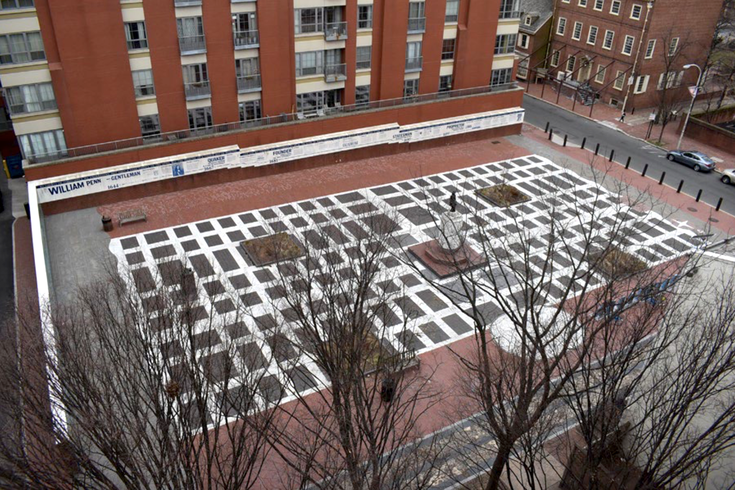
January 08, 2024
 Provided Image/National Park Service
Provided Image/National Park Service
The National Park Service has retracted its proposal to remove the William Penn statue from Welcome Park in Philadelphia. The NPS says the plan had been released prematurely and without being subjected to a complete internal agency review.
The proposed plan to remove the William Penn statue from Welcome Park in Old City was withdrawn by the National Park Service on Monday after it was sharply criticized by a Republican state lawmaker and other conservatives.
On Friday, the NPS revealed plans to redesign the park – a seldom-visited plaza that sits on the site of the Philadelphia founder's former home near Second and Walnut Streets. The overhaul called for a more "inclusive" design that would shift some of the park's focus away from Penn in favor of an "expanded interpretation of the Native American history of Philadelphia."
But the NPS retracted those plans Monday, saying the proposal had been "released prematurely and had not been subject to a complete internal agency review." It also closed the public comment period it had opened.
"The National Park Service remains committed to rehabilitating Welcome Park as the nation prepares to commemorate the 250th anniversary of the Declaration of Independence in 2026," the statement said. "Upon completion of all the necessary internal reviews, the park looks forward to engaging in a robust public process to consider options for refurbishing the park in the coming years."
Welcome Park – named after the ship, Welcome, that brought Penn to Philadelphia from England – was completed in 1982 in celebration of the city's 300th anniversary. It is part of Independence National Historical Park, which also includes Independence Hall and the Liberty Bell, but it receives little foot traffic.
The withdrawn plan also called for removing the replica of the Slate Roof House that Penn once rented as his primary residence, adding a ceremonial gathering space and replacing the Penn timeline exhibit with new panels. The proposed redesign was was developed with input from Indigenous tribes including the Delaware Nation, Shawnee Tribe and the Delaware Tribe of Indians.
After Fox News brought national attention to the proposal over the weekend, the plan was roundly criticized by Republican lawmakers and conservatives.
In a statement, Pennsylvania House Leader Bryan Cutler accused President Joe Biden of "scraping the bottom of the barrel of wokeism to advance an extreme ideology and a nonsensical view of history." Cutler's office did not immediately respond to a request for comment.
Though much of the outcry was tinged with partisan jabs at the Democratic Party, some observers criticized the plans from a historical standpoint, saying the NPS is overlooking Penn's legacy as an early champion of religious freedom who strived to be humane and respectful with Native Americans.
"Ironically, William Penn was actually an outspoken advocate for the rights of Native Americans," National Review writer Nate Hockman wrote in a post on X, formerly Twitter. "Penn's treaty with the Lenape... led to 75 years of peace within the colony."
That treaty, called the Treaty of Shackamaxon, was signed in 1682 at the site marked by Penn Treaty Park in Fishtown, where another statue of Penn stands. As several X users pointed out, the threat of Penn being erased from Philadelphia history is hard to take seriously in a city where his likeness and name are everywhere — most notably as a statue that has long stood atop City Hall.
"The tallest statue atop any building in the world (IIRC) is the 37-foot bronze Calder statue of William Penn atop Philadelphia's City Hall, of which the tiny statue in a forgotten brutalist plaza is a replica," Adam Bonin, a Philadelphia lawyer, wrote on X. "No one's erasing William Penn here."
In addition to Penn Treaty Park and City Hall, the likeness and name of William Penn remains present throughout Philadelphia – not to mention that Pennsylvania, which Penn also founded, bears his name.
If they'd just removed the statue without announcing it, no one would have noticed or cared. https://t.co/CRl0KVjHO9
— Ryan Godfrey (@rgodfrey) January 8, 2024
To some, the debate over the statue harkened back to tensions over other monuments of people with checkered histories. Pressure stemming from Black Lives Matter protests in 2020 led to the removals of the statue of former Mayor Frank Rizzo in Center City and a mural honoring him in South Philadelphia. That same summer, another conflict erupted over the Christopher Columbus statue in Marconi Plaza, which was concealed in a wooden box until a Pennsylvania judge ruled the box had to be removed in late 2022.